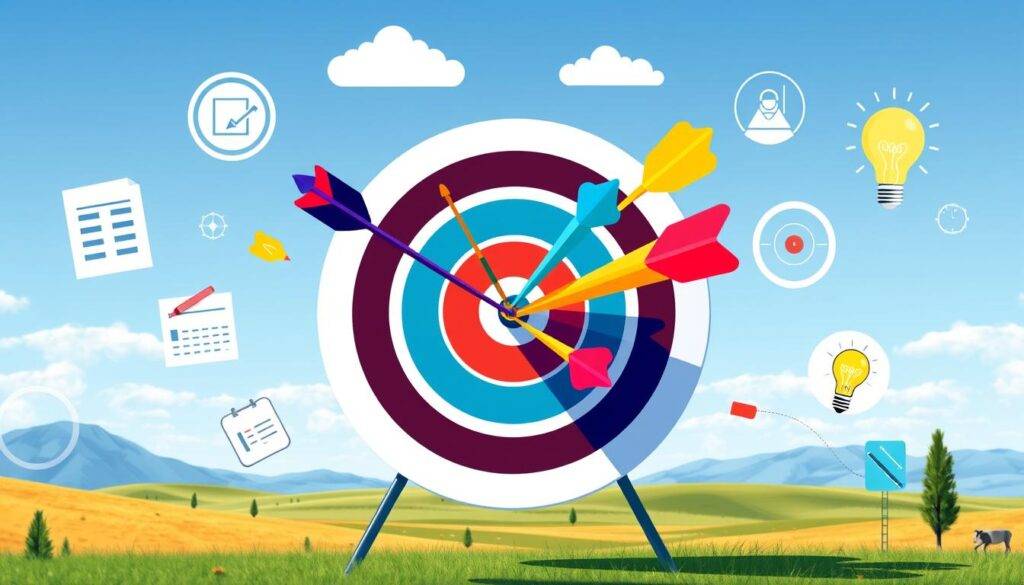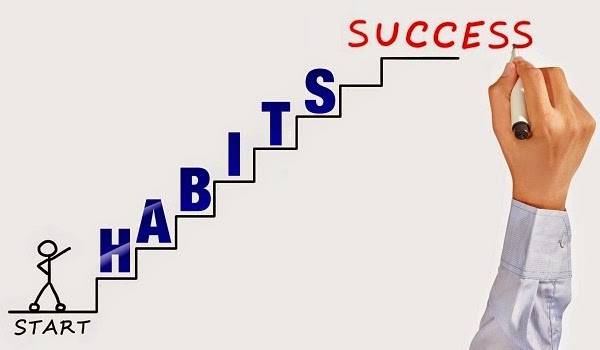“The future belongs to those who believe in the beauty of their dreams.” – Eleanor Roosevelt
Setting personal development goals is key for anyone looking to grow. It helps you understand what you want and where you’re headed. This guide offers a detailed plan for setting personal growth and upskilling goals to reach your highest potential.
Key Takeaways
- Establish a clear vision and conduct a SWOT analysis to identify your strengths, weaknesses, opportunities, and threats.
- Set specific, realistic, and achievable goals that challenge you and align with your passions and values.
- Develop a plan to acquire the necessary skills and resources to accomplish your goals.
- Regularly review your progress, celebrate your achievements, and adjust your plan as needed.
- Cultivate a growth mindset and embrace lifelong learning to unlock your full potential.
Understand the Importance of Personal Growth Goals
Personal development or growth goals are goals you set to reach your full potential. This involves checking your skills, finding areas you’re good at, and planning how to improve. Studies show that setting personal growth goals boosts motivation, self-esteem, self-confidence, and autonomy.
What are Personal Development Goals?
Personal development goals are specific targets to improve your abilities and well-being. These goals can cover many areas, like career advancement, financial stability, health, relationships, and personal growth.
Benefits of Setting Personal Growth Goals
- Develop your strengths and talents, leading to greater success in your endeavors.
- Gain a clear sense of direction and purpose, which can boost your motivation and self-confidence.
- Stay focused and accountable, ensuring you make consistent progress towards your desired outcomes.
- Enhance your self-esteem and feelings of autonomy as you achieve your goals.
- Acquire new skills and knowledge, giving you a competitive edge in your career or personal life.
By setting personal growth goals, you start a journey of self-discovery and self-improvement. This empowers you to become the best version of yourself and unlock your full potential.
“The greatest achievement in life is to constantly strive for personal growth and development.” – Brian Tracy
Define Your Vision and Conduct a SWOT Analysis
Start by writing down your future goals. This means thinking about what you like, what you want to achieve, and what you’re good at. Knowing what drives you and where you see yourself helps guide your growth.
Next, do a SWOT analysis. This helps you see where you stand now and where you can grow. It shows your strengths, weaknesses, chances, and challenges. This info helps you set smart goals and plan how to reach them.
A SWOT analysis is key for planning your career and personal growth. A Businessweek survey found most people think they’re top performers. But, a SWOT analysis gives a clearer view of your real strengths and areas to work on. It helps you make a solid plan for your growth.
| Strengths | Weaknesses |
|---|---|
|
|
| Opportunities | Threats |
|
|
Knowing your strengths, weaknesses, chances, and challenges helps you plan better. You can use your strengths, work on your weaknesses, grab opportunities, and face threats. This way, you can make a plan that’s just right for you.
“Awareness of strengths, weaknesses, opportunities, and threats can be an invaluable advantage for personal and professional growth.”
Set Specific, Realistic, and Achievable Goals
Setting effective goals is key to growing and improving yourself. Goal-setting experts Locke and Latham say goals should be Specific, Measurable, Achievable, Relevant, and Time-bound (SMART). This makes sure your goals are clear, challenging but doable, and fit with your big dreams.
Clarity and Challenge in Goal Setting
Specific goals give you a clear idea of what you want to do. For example, “losing 25 pounds by the end of the year” is better than just saying “I want to lose weight.” Locke’s theory says setting goals that are both challenging and reachable can motivate you and help you improve.
Commitment, Feedback, and Task Complexity
Being committed to your goals is very important. Studies show that writing down your goals and telling others about them can help you stay on track. It’s also key to check your progress often and change your plan if needed. Breaking down big goals into smaller tasks can also help you succeed.
| Key Principles of Effective Goal Setting | Benefits |
|---|---|
| SMART (Specific, Measurable, Achievable, Relevant, Time-bound) | Provides clarity, focus, and a clear path to success |
| Challenging yet Realistic | Boosts motivation and performance improvement |
| Documented and Shared | Increases commitment and accountability |
| Broken Down into Smaller Tasks | Makes complex goals more manageable |
| Regularly Evaluated and Adjusted | Ensures ongoing progress and adaptability |
By using these tips, you can make a plan for personal growth that’s both exciting and achievable.

Determine the Skills Needed to Achieve Your Goals
Starting your personal development journey means knowing what skills you need to reach your goals. You must assess your current skills and compare them to what you want to achieve. This helps you see what skills you’re missing.
A skills gap analysis shows where you need to improve. It helps you plan how to get the skills you need. Remember, achieving your goals is about having the right skills, not just setting them.
- Workshops led by knowledgeable instructors can enhance understanding of new concepts and skills in various fields.
- Online resources like Khan Academy’s Hour of Code can be utilized to improve professional skills and deepen knowledge in areas where experience is limited.
- Joining industry associations can facilitate networking opportunities and provide support for personal development and career advancement.
- Attending conferences focused on specific fields can aid in connecting with peers, staying updated on industry trends, and expanding professional networks.
- Finding a mentor who is successful in the desired field and willing to guide can significantly contribute to self-improvement.
- Engaging in skills-based practice through project teams allows professionals to test their abilities, identify areas for improvement, and gain practical experience.
The journey of skills assessment and skills gap identification never ends. As you grow, you’ll find new areas to improve. Stay open, flexible, and dedicated to your personal and professional self-improvement goals.
“The only way to do great work is to love what you do. If you haven’t found it yet, keep looking. Don’t settle.” – Steve Jobs
Develop a Plan to Acquire the Necessary Skills
To reach your personal development goals, you need to get the right skills. There are many ways to do this. Online learning through tutorials, podcasts, and courses is affordable and flexible. Getting professional certifications can show your skills, especially in tech. Working with a mentor helps in learning soft skills like leadership and communication.
Self-Study and Online Learning Resources
Today, learning online is easy and wide-ranging. Sites like Udemy, Coursera, and edX have many courses. You can also find tutorials on YouTube, podcasts, and online groups to keep learning and growing.
Professional Certifications and Mentorship
Getting professional certifications can boost your career. They show you’re serious about your field and can lead to new chances. Having a mentor offers great advice and support on your journey.
| Skill Development Approach | Benefits |
|---|---|
| Self-Study and Online Learning | Flexible, cost-effective, continuous skill development |
| Professional Certifications | Demonstrate expertise, enhance credibility, open new doors |
| Mentorship | Gain valuable guidance, develop soft skills, expand network |
By using a mix of these methods, you can get the skills you need. This will help you achieve your goals and reach your full potential.
“The only way to do great work is to love what you do. If you haven’t found it yet, keep looking. Don’t settle.” – Steve Jobs
easy steps to set and achieve self development goals for a fulfilling life
Reaching your personal growth goals is simple. Start by setting clear goals and planning how to achieve them. This makes your journey easier and keeps you focused.
To start, figure out what skills and habits you need. Break big goals into smaller steps you can do every day. Make sure your goals are SMART to stay on track.
Watch out for obstacles and have a plan to get past them. Use mentors or friends to keep you going. Check your progress often, celebrate wins, and adjust your plan as needed.
This easy, step-by-step method helps you grow and live a better life. Just remember to keep moving forward and be open to change.
“The journey of a thousand miles begins with a single step.” – Lao Tzu
Practical Tips for Setting and Achieving Self-Development Goals
- Define your vision and conduct a personal SWOT (Strengths, Weaknesses, Opportunities, Threats) analysis to gain clarity.
- Set specific, measurable, and achievable goals that align with your values and long-term aspirations.
- Break down larger goals into smaller, actionable steps to maintain momentum and a sense of progress.
- Identify the skills and resources needed to reach your goals, and develop a plan to acquire them.
- Cultivate a growth mindset, embrace lifelong learning, and be open to feedback and new perspectives.
- Celebrate your achievements, reflect on your progress, and set new, more challenging goals to continue your growth.
| Goal Category | Example Goal | Action Steps | Timeframe |
|---|---|---|---|
| Health & Wellness | Improve physical fitness and reduce stress |
|
3 months |
| Professional Development | Acquire a new technical skill |
|
6 months |
| Personal Growth | Improve communication and public speaking abilities |
|
1 year |
Evaluate Progress and Adjust Your Plan
It’s key to check your progress and tweak your goal plan often. Having a way to track and monitor your goals helps you see how far you’ve come. This lets you make changes when needed.
Tracking and Monitoring Your Goals
Set milestones for short, medium, and long-term goals. This helps you see how far you’ve come and what needs work. Celebrate small wins to keep yourself motivated and excited about your journey.
Overcoming Obstacles and Seeking Support
Face obstacles head-on by seeking help from mentors or peers. Being open to change and adapting your plan can help you succeed. Stay flexible and ready to adjust as things change.
“Life’s real failure is when you do not realize how close you were to success when you gave up.” – Thomas Edison
Remember, staying accountable and having a growth mindset are key. Regularly check your progress and adjust as needed. This keeps you focused and motivated to reach your goals.
Cultivate a Growth Mindset and Embrace Lifelong Learning
To reach your personal goals, you need a growth mindset. This means believing you can grow your skills with hard work. By always learning and improving, you stay motivated and ready for change.
Being open and eager to learn opens up your full potential. It lets you live a life that truly reflects your values and dreams. Resilience is key, helping you bounce back from tough times and see challenges as chances to grow.
- Embrace a growth mindset that sees your abilities as malleable and developable through dedication and effort.
- Cultivate a love for learning and continuously seek out new knowledge, skills, and experiences.
- Approach obstacles and failures with curiosity and a determination to learn, rather than viewing them as barriers.
- Engage in regular self-reflection to identify areas for growth and set actionable goals for personal development.
- Seek out constructive feedback and be open to learning from others, understanding that criticism can be a valuable tool for growth.
By adopting a growth mindset and a love for learning, you unlock your true potential. You start a rewarding journey of self-discovery and ongoing growth.
“The future belongs to those who learn more skills and combine them in creative ways.” – Robert Greene
Celebrate Your Achievements and Set New Goals
When you reach your personal development goals, take time to celebrate your wins. Recognizing your progress boosts your self-confidence and motivation to continue.
Here are some ways to celebrate success:
- Give yourself a treat, like a spa day or a special meal.
- Share your success with family and friends, enjoying their admiration and support.
- Thank those who helped you succeed.
- Do something creative, like dancing or a favorite activity.
- Reflect on your journey and plan for the future.
After celebrating, it’s time to set new goals. These should build on what you’ve learned and push you towards your dreams. This cycle of goal-setting, achievement, and new objectives keeps you growing.
“The only way to do great work is to love what you do. If you haven’t found it yet, keep looking. Don’t settle.” – Steve Jobs
By celebrating your achievements and setting new goals, you grow personally and stay motivated. This cycle empowers you to reach your full potential and live a fulfilling life.

Conclusion
Setting and achieving personal development goals is a great way to reach your full potential. It helps you develop new skills and live a more fulfilling life. By understanding personal growth, setting clear goals, and learning new skills, you start a journey of self-improvement.
Stay focused and flexible on your path. Celebrate your progress and enjoy the journey of personal growth. Reflect on your past year, looking at your wins and challenges. This helps you see how far you’ve come and what you’ve learned.
Plan your goals for the next year and make a step-by-step plan. Look for resources and support to help you reach your goals. Celebrate your achievements and be kind to yourself when faced with challenges. This keeps you motivated and helps you grow.
FAQ
What are personal development goals?
Personal development goals help you reach your full potential. You start by checking your skills and finding areas you’re good at. This way, you can plan to become the best version of yourself.
What are the benefits of setting personal growth goals?
Setting goals boosts motivation, self-esteem, and confidence. It also helps you use your strengths to succeed. Goals give you direction in your career and a head start over others.
How do I define my vision and conduct a SWOT analysis?
Start by writing your vision through self-reflection. Understand your interests, ambitions, and skills. A SWOT analysis helps you see where you stand and where you can grow.
What principles should I follow when setting my goals?
Goals should be Specific, Measurable, Achievable, Relevant, and Time-bound (SMART). They should be challenging but reachable. Stay committed and track your progress by breaking down big goals into smaller ones.
How do I determine the skills I need to achieve my goals?
Compare your current skills with what you need for your goals. This helps you plan how to grow and learn new skills.
What are some ways to develop the necessary skills?
Learn through online tutorials, podcasts, and courses. Professional certifications can boost your credibility. Working with a mentor helps with soft skills like leadership and communication.
How do I stay on track and adjust my plan as needed?
Regularly check your progress and adjust your plan. Use milestones to track your goals. Seek help when facing obstacles to stay on track.
How do I cultivate a growth mindset and embrace lifelong learning?
Believe that your abilities can grow with effort. Embrace lifelong learning to stay motivated and adaptable on your journey of self-discovery.
How do I celebrate my achievements and set new goals?
Celebrate your achievements to boost your confidence and motivation. Then, set new goals to keep growing and moving towards your future.




























































